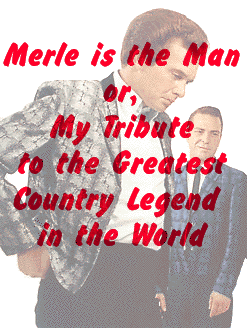
-- Peter Guralnick, 1979

|
|
There is no
one in
contemporary popular music who has created a
more impressive legacy, or one that spans a wider variety of styles. In a genre
that has always relied upon filler to round off the album coming off a country
hit, Merle has written the vast preponderance of his material ("Without writing
you have nothing," says Merle, meaning both the royalties and the satisfaction)
and has used each album as a vehicle for personal expression, sometimes not even
leaving room to include the hit. He has written blues and folk songs, social
commentaries and classic love songs, protest and anti-protest, gospel and
ballads, prison and train songs, drinking songs, and updates of Jimmie Rodgers's
blue yodels. He has written just about every kind of song there is, in fact,
except a convincing rock number, and while such prolificness is not without its
price (sometimes the rhymes are less than fresh, some of the metaphors could have
been worked out a little more fully and sometimes you wish an idea had been left
to simmer rather than having been appropriated immediately into a song), taken as
a whole the body of work that he has created is absolutely
staggering. -- Peter Guralnick, 1979 |
|
About a year ago (I'm writing in
February, 1997), I wrote:
Twenty-five tribute pages for Nine Inch Nails, a dozen online
shrines to Hootie and the Blowfish and not one page (except for this embryonic
effort) dedicated to Merle Haggard!? Just ain't right. I'm happy to say that things have changed, and that there's now a solid, if not exactly huge, collection of Merle info online.
Over the past two years, thanks to a slew of reissues on CD (including a couple of
major boxed sets) and two tribute albums, Merle (shown above with longtime Stranger and chicken-pickin' virtuoso Roy Nichols) is becoming known to a whole new generation of fans. About
time, too, I say. It's still the case that all of this is STILL somehow managing to fly beneath the
radar of any music press -- country, mainstream or alternative. But progress is
being made. His record company even got around to putting up a pretty
substantial promo page. Not that that absolves them from recycling the odd tombstone design of the 1994 album and using it for Merle's most recent one. If you really are interested in experiencing Mr. Haggard in all his glory, go out and buy Bear Family's Untamed Hawk, a 5-CD
collection of all of Merle's work for Talley and Capitol from 1962 to 1968. It's pricey, but well worth the hundred bucks or so it'll set you back. For more economically-minded shoppers, Razor
& Tie's The Lonesome Fugitive, a 2-CD greatest hits package,
covers the Capitol catalog up to 1977. And Koch International has reissued
Sing Me Back Home, Swinging Doors and the Bottle Let Me
Down, Strangers, Same Train, A Different
Time (Merle's Jimmie Rodgers tribute) and the spectacular A
Tribute to the Best Damn Fiddle Player in the World (or, My Salute to Bob
Wills). As for the tributes: in Mama's Hungry Eyes big-time
Nashville cats cover Merle -- some great versions, some not so hot -- and in
Tulare Dust, Alameda, California's Hightone Records comes up
with an hommage that actually manages to give the overworked genre a
good name. Capitol Nashville issued a decent one-disk collection of vintage recordings
from the vaults -- marred by closing out the set with a live performance of
"Okie" followed by what is perhaps Merle's most unpleasant (and certainly most
hypocritical) song, "Fightin' Side of Me," thereby perpetuating the public's
perception that the guy's a know-nothing reactionary instead of one of the great
geniuses of pop music (any genre) and in my mind the most powerful figure in the
history of country music. And now Capitol's come out with Down Every Road, 4-CD box
covering everything from "Skid Row" to 1994. Not surprisingly,
the emphasis here is on Merle's Capitol years. That's a little disappointing to
me, as an owner of Untamed Hawk -- Down Every
Road covers much of the same ground -- and gives
short shrift to Merle's MCA, Epic and Curb work. Nevertheless, it's a beautiful
box: lots of great photos and essays and a pretty much essential purchase. Of course we can't forget that the Hag has kicked his best album in years into
the mix. 1996 features an avuncular, laid-back Merle and a
number of strong originals, including instant classic "Truck Driver's Blues," an
intriguing cover of Iris DeMent's intensely personal "No Time to Cry" and a
singalong with Dwight Yoakam, longtime pal Bob Teague and BUCK
OWENS on "Beer Can Hill." Contributions, suggestions, criticisms welcome. |